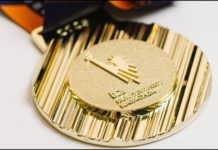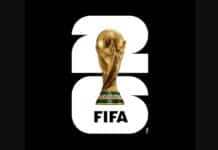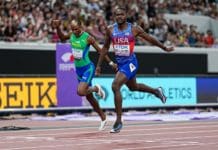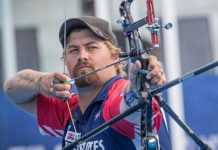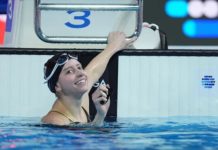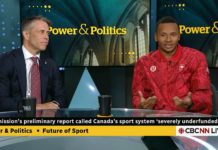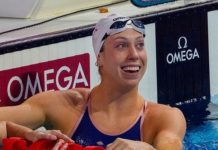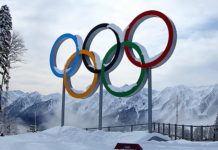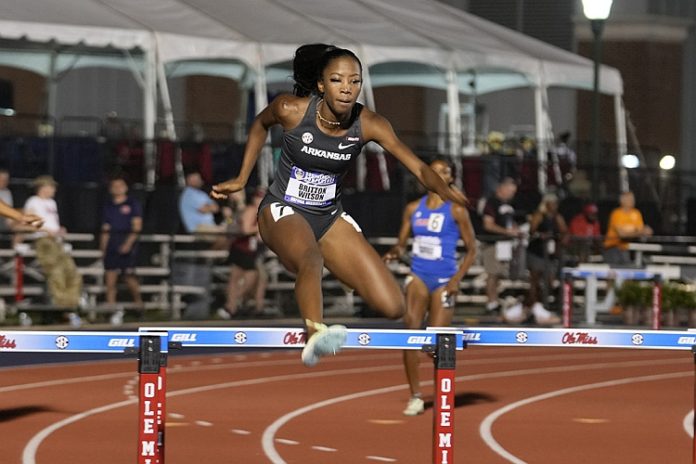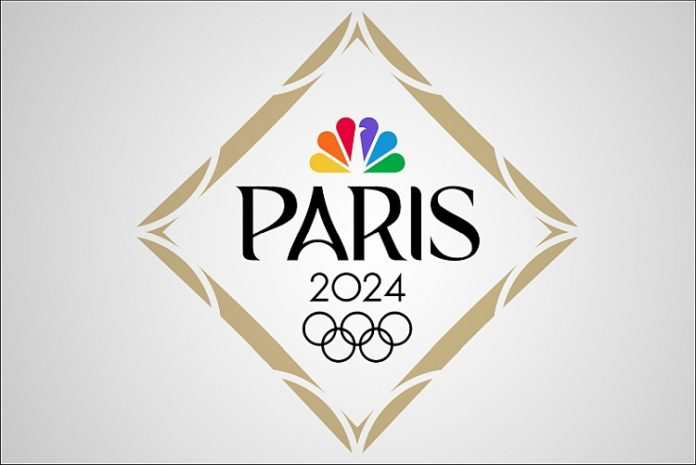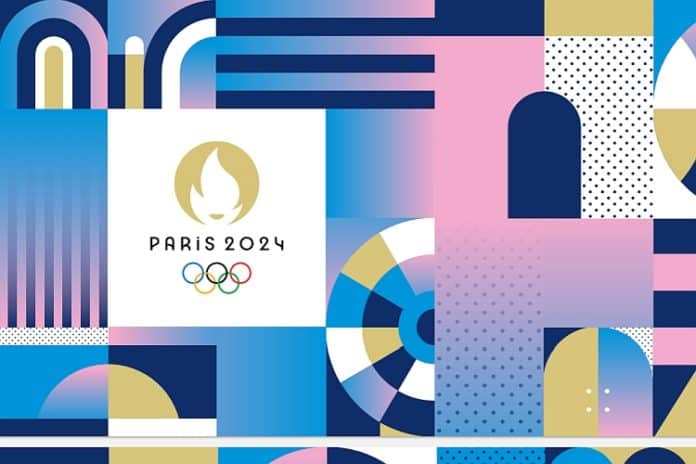★ The Sports Examiner: Chronicling the key competitive, economic and political forces shaping elite sport and the Olympic Movement.★
★ To get The Sports Examiner by e-mail: sign up here! ★
≡ THE 5-RING CIRCUS ≡
1. Britton Wilson 49.13 at SEC; five world leads in Nairobi
2. Weightlifting re-admits Russia; gymnastics will wait
3. Paralympics says no re-entry until General Assembly vote
4. Berlin 2036 Olympic bid a real possibility
5. Park City allocating $25,000 for “Olympic work” in 2023-24
A sensational weekend of track & field, with world-leading performances in 11 events, including five at the SEC Championships and five at the Kip Keino Classic in Nairobi. Arkansas star Britton Wilson won another SEC double in the women’s 400/400H and smashed her own 400 m collegiate record twice during the meet, lowering it to 49.13 in the final! Wow! The International Weightlifting Federation, as expected, followed the lead of the International Olympic Committee and will allow “neutral” Russians and Belarusians to compete, but the gymnastics federation (FIG) was a surprise, opting to wait some more. The International Paralympic Committee was told by its independent appeal panel that it did not provide all of the available information when it suspended the Russian and Belarusian national committees, but the competition ban still stands. The IPC will take up the issue at its General Assembly in September. German Interior Minister Nancy Faeser came out in favor of a Berlin 2036 bid, despite it being the centennial of the infamous Nazi Games of 1936. Park City is allocating $25,000 for “Olympic” work as a placeholder in its 2023-24, expecting to see more action on a possible bid visit in advance of a possible award of the 2034 Winter Games.
● World Championships: Boxing (Uzbekistan leads men’s Worlds medal table) = Ice Hockey (U.S. opens with two wins in men’s Worlds) = Judo (Riner wins 11th world title) ●
● Panorama: Artistic Swimming (Spain strong in Somabay World Cup) = Athletics (Korir and Saina win U.S. 25 km) = Canoe-Kayak (Carrington wins two in Szeged Sprint World Cup) = Cycling (3: Evenepoel back in front in Giro d’Italia; Reusser’s final-stage win takes Itzulia women’s; Pidcock and Pieterse win in Mountain Bike World Cup) = Fencing (U.S. grabs two team silvers in Sabre World Cups) = Modern Pentathlon (vet Prades and new star Bryson take World Cup wins in Sofia) = Rugby Sevens (New Zealand sweeps Toulouse and season titles) = Shooting (China wins big in ISSF Pistol-Rifle World Cup) = Swimming (Dressel returns, Ledecky and Douglass star in Atlanta) = Triathlon (Wilde and Coldwell win in Yokohama) ●
1.
Britton Wilson 49.13 at SEC; five world leads in Nairobi
It was a hot weekend of running, jumping and throwing starting with an excellent Continental Tour Gold meet in Nairobi (KEN), but then shifting to the conference championship meets in the U.S., including a staggering performance by Arkansas junior Britton Wilson.
She made a name for herself in 2022 by winning the NCAA Championships, finishing second at the U.S. Nationals and then grabbing a fifth-place finish at the World Championships in Eugene. Along the way, she scored a 50.05/53.75 double at the SEC Championships, leading many to ask how fast she could be in the 400 m flat?
Well, she told us. At the 2023 SEC meet in Baton Rouge, Louisiana, she smoked the field in the 400 m prelims, winning in a world-leading 49.40, that is also a collegiate record, crushing her own mark of 49.51 from mid-April. She then won the 400 m hurdles prelims at 53.76, a mark which no one else has approached this season.
On Saturday, Wilson rewrote the record book again, winning the 400 m in another collegiate record of 49.13, moving her to no. 17 all-time and no. 4 all-time U.S. Only Sanya Richards-Ross (48.70 ‘06), Valerie Brisco-Hooks (48.83 ‘84) and Chandra Cheeseborough (49.05 ‘84) have ever run faster in U.S. history.
Of course, she also won the 400 m hurdles a little later in the meet for her second straight double-double, in 53.28, the no. 2 performance of the year in that event (she has the top three).
Will she go for a 400/400H double at the NCAA meet? That would be epic as the semifinals are only 30 minutes apart and the finals are 25 minutes apart, not to mention the 4×400 m relays. But nothing seems beyond Wilson at this point.
Elsewhere at the SEC meet, there were world-leading performances in four men’s events:
● Men/4×100 m: 37.90, LSU (mixed nationalities)
● Men/4×400 m: 2:57.76, Florida (mixed nationalities)
● Men/Triple Jump: 17.87 m (58-7 1/2), Jaydon Hibbert (JAM/Arkansas)
● Men/Decathlon: 8,589, Kyle Garland (USA/Georgia)
The relays and triple jump are collegiate records. LSU and Florida (37.93) both broke Florida’s 37.97 mark from 2019, with the LSU quartet of Brandon Hicklin, Dorian Camel, Da’Marcus Fleming and Godson Oghenebrume (NGR) getting to the line first.
In the 4×400 m, three teams were under three minutes, with Florida winning behind Jevaughn Powell (JAM), Emmanuel Bamidele (NGR), Jacory Patterson and Ryan Willie in a record 2:57.76, followed by Alabama’s Chris Robinson, Khaleb McRae, Tarsis Orogot (UGA) and Corde Long (2:58.01) and Georgia, at 2:59.63 with Elija Godwin, Matthew Boling, Chris Morales Williams (CAN) and Will Sumner. Only six nations have ever run faster than Florida did.
Garland’s 8,589 in the decathlon would also have been a collegiate record, if not for his 8,720 last year!
Not a record, but really fast was the women’s 100 m hurdles, with LSU’s Alia Armstrong winning in 12.40 (+0.4) ahead of Ackera Nugent (JAM/Arkansas: 12.43) and Kentucky’s Masai Russell (12.47). Armstrong won her heat in a blistering 12.31, but with over-the-allowable wind of 2.2 m/s.
At the Big XII Championships in Norman, Oklahoma, the newest women’s long jump prodigy from the University of Texas – Ackelia Smith from Jamaica – claimed the world lead at 7.08 m (23-2 3/4).
Texas teammate Julien Alfred (LCA) won the women’s 100 m in a wind-legal 10.84, now no. 3 in the world for 2023. She had earlier anchored the Longhorns to a 41.89 win in the 4×100 m, smashing their own collegiate record of 42.00 from the Texas Relays in April.
¶
In Nairobi, five events saw world-leading performances at the Kip Keino Classic:
● Men/100 m: 9.84, Ferdinand Omanyala (KEN)
● Men/800 m: 1:43.32, Emmanuel Wanyonyi (KEN)
● Men/1,500 m: 3:32.01, Raynold Kipkorir (KEN)
● Men/Hammer: 79.78 m (261-9), Wojciech Nowicki (POL)
● Women/High Jump: 2.00 m (6-6 3/4), Yaroslava Mahuchikh (UKR)
The crowd was wild for seven Kenyan winners, especially for Omanyala, who won by daylight over Tokyo Olympic 200 m silver medalist Kenny Bednarek (9.98; wind -0.5). Wanyonyi won the 800 m over a lifetime best in 1:32.32, beating Commonwealth Games champ Wycliffe Kinyamal (1:43.66) and 1,500 m ace Timothy Cheruiyot (1:44.99).
Kipkorir, 18, won the men’s 1,500 in a lifetime best and world lead of 3:32.01, ahead of Abel Kipsang (3:32.70); Amos Kirui won the Steeple in 8:18.45; Mary Moraa won the women’s 800 m in 1:58.83; Beatrice Chebet took the 5,000 m in 15:15.82 and world-record holder Beatrice Chepkoech won the women’s Steeple in 9:13.51.
U.S. women were also impressive, with a wind-aided 10.86 win for TeeTee Terry in the 100 m (+2.5), and Sha’Carri Richardson in the 200 m in 22.07 (+1.7) – her second-fastest ever – beating Kyra Jefferson (22.77). Worlds bronze medalist Janee Kassanavoid won the women’s hammer at 74.25 m (243-7), ahead of fellow American Janeah Stewart (71.43 m/234-4) with Poland’s three-time Olympic champ Anita Wlodarczyk third at 70.27 m (230-6).
In the men’s sprints, Canada’s Aaron Brown won the 200 m in 20.12 ahead of American Kyree King (20.18), and Muzala Samukonga took the 400 m in 44.25, beating American Vernon Norwood (44.68).
2.
Weightlifting re-admits Russia; gymnastics will wait
The International Weightlifting Federation is desperately trying to get back onto the Olympic program for 2028, and so when the International Olympic Committee gives direction, it follows.
On Friday, the IWF announced:
“Following an online meeting of its Executive Board (EB) today, the IWF decided to endorse and apply the IOC’s ‘Recommendations for International Federations and international sports event organisers on the participation of athletes with a Russian or Belarusian passport in international competitions.’”
And at the end, added:
“From the beginning of this profound crisis, which deeply affects the conduct of international sport, the IWF has been mindful to observe the recommendations issued by the International Olympic Committee.”
Truer words were never spoken.
However, Russian reaction was negative. Said Russian Weightlifting Federation chief Maxim Agapitov:
“This belated statement puts us in the position of journalists who have received an entry visa when the plane has already left for the competition.
“It seems that the IWF has become an instrument of hybrid war against Russia, allowing itself to be used in the Russophobic policy of the West. The IWF’s demonstration of the solidarity imposed by the IOC with one country against another does not correspond to either sports or Olympic principles. The decision on the possible admission of Russians and Belarusians in a neutral status is not a strong-willed decision of the International Weightlifting Federation, it only once again emphasizes its dependence on the ‘recommendations’ of the IOC.
“I call for a unified approach and the creation of equal conditions for athletes from all countries. And now we have witnessed a trend that has been established over the past year, when international federations only pretend to defend equality in sports, but in fact create new obstacles to the realization of the legitimate rights of our athletes in place of the previous barriers.”
One of the reason that Agapitov might have been so irritated was the approach taking by the Federation Internationale d’Escrime (FIE), which voted to allow Russian and Belarusian re-admission as “neutrals,” but then disqualified 13 of 24 fencers submitted by the Russian Fencing Federation, based on the IOC’s re-entry guidelines, especially those athletes who are part of, or supported by, clubs affiliated with the military or national security services.
¶
Meanwhile, there was a surprise from the Federation Internationale de Gymnastique (FIG), whose President, Morinari Watanabe (JPN) has consistently made references to re-inclusion of Russian and Belarusian athletes.
Its Saturday announcement included:
“After a new assessment of the situation involving the Russian and Belarusian athletes/officials, the FIG Executive Committee considers that the measures already adopted on 1-2 March 2023 and based on Article 13.3 of the FIG Statutes remain fully in force, without any further changes. The FIG will continuously monitor the overall situation and may reassess those measures depending on the evolution of the circumstances.”
So, Russia and Belarus remain out, at least for now. FIG has time; it’s 2023 Worlds begin on 30 September in Antwerp (BEL).
3.
Paralympics says no re-entry until General Assembly vote
The International Paralympic Committee got a shock on Friday, when its Appeals Tribunal overturned its ban on Russian and Belarusian participation in events it controls. Per its announcement on Friday:
“The IPC Independent Appeals Tribunal did not decide on the merits of the two NPC suspensions, but instead determined that the General Assembly should have considered the same supporting evidence that the IPC put before the Appeals Tribunal, including new information that became available to the IPC after the General Assembly’s decision in November 2022.
“Although this issue was not raised by either party, the Appeals Tribunal did not wish to substitute itself for the IPC Membership which had voted to suspend the NPCs, and it therefore set aside the decision. As such, the full information and evidence available to the Appeals Tribunal will be put before the IPC’s General Assembly in September, for its consideration. …
“The Appeals Tribunal also confirmed that the IPC’s decision not to accept athlete entries from NPC Russia and NPC Belarus in the world and regional championships and sanctioned-level competitions of the six World Para Sports governed by the IPC, remains in force.”
IPC President Andrew Parsons (BRA) said:
“Following the events that we saw unfold just before the Beijing 2022 Paralympic Winter Games, our members made it clear that the membership status of NPCs Russia and Belarus needed to be considered by the General Assembly.
“We believe that our actions taken to call the [November ] 2022 Extraordinary General Assembly in Berlin and allow every member the chance to present their views on these important matters, fulfilled our obligations under our rules. Our Independent Appeals Tribunal decided differently, which is a decision we certainly respect, but disagree with.
“As we already had committed to do, we will bring these matters back to our General Assembly later this year, follow the Appeal Tribunal’s directions by presenting the additional evidence we have since acquired, and give our members the opportunity to decide these important matters.”
The 2023 General Assembly is scheduled for 27-29 September in Manama, Bahrain, with more than 300 attendees from the IPC’s 209 members expected to attend.
4.
Berlin 2036 Olympic bid a real possibility
It has long been thought that a German bid for the 2036 Olympic Games would be a bad idea, coming on the centennial of the Berlin 1936 Games, one of its truly infamous editions due to its use by the Nazi Party as a propaganda exercise for its racist regime.
Those thoughts are changing, quickly, especially since the International Olympic Committee no longer uses an up-or-down vote of its members to select a host. The discussion-oriented approach now in place allows bids to be made inexpensively and without the humiliation of a public defeat.
So, German Interior Minister Nancy Faeser, who was critical of FIFA’s choice of Qatar as the site of the 2022 FIFA World Cup in view of its human right situation, but ultimately agreed that the pressure of the event to cause changes in conditions for migrant workers had some merit, now thinks Berlin 2036 might be right.
In an interview with the German news site, The Pioneer, she said should could “imagine” a bid for the 2036 Olympic Games:
“I generally think it would be a right step to apply for the Olympic Games again. I am very much in favor of it.”
As for a Games on the centennial of the 1936 Games, she noted that there will be a retrospective on the Nazi Games anyway, so why not do it “at the place where this happened, where exclusion, where this terrible disregard for humanity took place.
“They were terrible Games in 1936. The Nazis organized the games there and wanted to present themselves.
“If we demand these criteria, then I think we must set a good example and allow such a major sporting event to take place in Germany again.”
The German National Olympic Committee (DOSB) is studying the issue and expects to make a recommendation by the end of the year. Berlin tried for the 2000 Olympic Games, but existed in the second round as Sydney was ultimately chosen over Beijing.
5.
Park City allocating $25,000 for “Olympic work” in 2023-24
It’s not a large amount, to be sure. But it’s a nod toward more action on the Salt Lake City bid for the 2034 (or 2030) Olympic Winter Games.
The Park Record reported that a placeholder amount of $25,000 for the Park City budget for 2023-24 is being sought by the city’s events staff for “Olympic Project Management,” described as a just-in-case item. However, if Salt Lake City’s bid advances to the point where an International Olympic Committee inspection team visits Utah, there will be some work involved in accommodating their inspection requirements.
The Park City area is an important one for the Salt Lake City bid, as it hosted bobsled, luge and skeleton and ski jumping and Nordic Combined at the Utah Olympic Park, which continues today as a busy training and competition site. The alpine Giant Slalom and snowboard competitions were held at the Park City Mountain Resort, with the alpine Slalom and Freestyle skiing at Deer Valley Resort.
The 2030 Olympic Winter Games host is expected to be selected next year, and there is a possibility that the 2034 Winter Games could be awarded at the same time.
≡ WORLD CHAMPIONSHIPS ≡
● Boxing ● In the absence of the U.S. and many top European boxing powers, the 2023 IBA men’s World Championships in Tashkent (UZB) turned into a coronation for eastern Europe, with Uzbekistan (5), Kazakhstan (4) and Russia (2) winning 11 of the 13 weight classes.
Four men won the second or third world titles:
● Lightweight: Sofiane Oumiha (FRA) won in 2017 and 2021
● Middleweight: Yoenlis Hernandez (CUB) won in 2021
● Heavyweight: Muslim Gadzhimagomedov (RUS) won in 2019
● Super Heavy: Bakhodir Jalalov (UZB) win in 2019
Three more went from Worlds silvers to gold:
● Flyweight: Hasanboy Dusmatov (UZB) won a 2017 silver at Light Fly
● Bantam: Makhmud Sabyrkhan (KAZ) won the 2021 silver
● Feather: Abdumalik Khalokov (UZB) won the 2021 silver
Those were the stars who moved up in 2023; Uzbekistan also got wins from Ruslan Abdullaev at Light Welterweight and Asadkhuja Muydinkhujaev at Welterweight for its five golds. They also two silvers and two bronzes for nine total medals, to lead the field.
Kazakhstan’s other wins came from Sanzhar Tashkenbay at Minimumweight, Aslanbek Shymberhenov at Light Middleweight and Nurbek Oralbay at Light Heavyweight.
Russia got a second win at Cruiserweight, from Sharabutdin Ataev; it also won four bronzes for a total of six, equal with Cuba (1-3-2) for second-most behind the hosts.
Prizes were $200,000 to the winners, $100,000 to the runner-ups and $50,000 to each of the bronze-medal winners for a total of $5.2 million. During the event, the IBA announced first-time awards to the 52 quarter-finalists who ended up losing in the bronze-medal matches, or $3,000 each ($156,000), upping the total purse to $5.356 million.
● Ice Hockey ● The 86th IIHF men’s World Championships is underway in Tampere (FIN) and Riga (LAT), with pool play continuing through the 23rd. The U.S. is off to a fast start, defeating defending champion Finland, 4-1, in the opener and then stomping Hungary, 7-1.
Switzerland and Canada have both won their first two games and lead Group B. The top four teams in each group advance to the playoffs, beginning on 25 May and concluding with the medal matches on 28 May.
● Judo ● The 2023 IJF World Championships in Qatar began with controversy with Russian and Belarusian participation as “neutrals,” but will end up being remembered for another superb performance from French superstar Teddy Riner.
Already a 10-time World Champion, the 34-year-old Riner won an unexpected silver at the Tokyo Olympic Games and would like to go out on top in front of home fans in 2024. He’ll be the favorite after an exhausting performance in Doha.
He won his third and fourth-round matches in overtime, but then scored an imposing ippon against no. 1-ranked Temur Rakhimov (TJK) in the semis, moving on to face Russian (that is, “neutral”) Inai Tasoev, the 2021 European Champion. This was another tense match and went scoreless into overtime, when Tasoev rolled Riner across his back, but no score was given. Riner followed with his own throw – an uzi-waza – that placed Tasoev on his back for a half-point (waza-ari) that won the match and gave Riner an 11th World title.
Spectacular, and the reception he will receive in Paris in 2024 will be deafening.
Elsewhere, Japan continues its decades-long reign as the world’s leading judo power with a total of 12 medals, winning six golds (no one else had more than two).
Japan its fourth win in the women’s division from Akira Sone, who won her second Worlds gold (also in 2019) at +78 kg, defeating 2022 bronze medalist Julia Tolofua (FRA) in the final.
The French also took silver in the men’s 78 kg class, with 2011 World Champion Audrey Tcheumeo winning her fourth individual Worlds medal, but losing in the final to first-time individual medal winner Inbar Lanir of Israel.
Russia’s “neutral” Arman Adamian, the 2019 European Games winner, took the men’s 100 kg class, beating two-time Olympic champ Lukas Krpalek (CZE) in the final.
The team event, of course, went to Japan, which defeated France (without Riner).
≡ PANORAMA ≡
● Artistic Swimming ● The third stop on the Artistic Swimming World Cup tour was in Soma Bay (EGY), and continues through Monday with the women’s Duet Free and Mixed Duet Free.
In the Women’s Solo Technical, it was Vasiliki Alexandri (AUT) winning a tight battle from Spain’s Iris Tio Casas, 263.8959 to 262.9333, and Alexandri then took second in the Women’s Solo Free, 338.2750 to 299.8084 for China’s Shiyi Dai.
Tio Casas got a second win in the women’s Duet Technical, teaming with Alisa Ozhogina to score 261.8625, ahead of Anastasia Bayandina and Eve Planeix (FRA: 250.2334).
China’s Shuncheng Wang swept the men’s events, winning the Solo Technical at 232.5792 and the men Solo Free at 291.9209.
In the Mixed Duet Technical, Fernando Diaz and Emma Garcia (ESP) won at 244.8500, with the Free section coming Monday. Mexico got its first-ever World Cup gold in the Mixed Team Technical, scoring 270.1584 to edge Italy (268.8417). The Italians came back to win the Mixed Team Free at 310.9160.
● Athletics ● Leonard Korir defended his national championship in the USATF 25 km race in Grand Rapids, Michigan on Saturday, striding away from Brian Shrader and Jacob Thomson in the final 1,500 m to win in 1:14:45. Thomson got second, ahead of Shrader, 1:14:49 to 1:14:53.
The women’s race was a first-time national title for Betsy Saina, who changed allegiance from Kenya in 2021. She ran together with former U.S. marathon record holder Keira D’Amato, the 2022 runner-up in this race, breaking away from the field after the 15 km mark. Saina then surged after 22 km and won in 1:24:32, to 1:24:39 for D’Amato. Jessa Hanson was a clear third in 1:25:33.
● Canoe-Kayak ● The ICF Sprint World Cup season got into full swing in Szeged (HUN), with New Zealand star and five-time Olympic gold medalist Lisa Carrington winning twice and taking a third medal.
The Tokyo Olympic winner in the K-1 500 m, Carrington led a New Zealand 1-2 with Aimee Fisher in 1:54.250 to 1:54.627, with former World 200 m Champion Emma Jorgensen (DEN) third in 1:55.917. Carrington also took the K-2 500 m race with Alicia Hoskin, 1:42.849 to 1:43.889 for Poland’s Martyna Klatt and Helena Wisniewska. And Carrington won a bronze on the women’s K-4 500 m, with China winning the gold.
Canadian star Katie Vincent was also busy. The six-time World Champion collected wins in the women’s C-1 500 m and the C-1 5,000 m and a bronze in the C-2 500 m race with Sloan MacKenzie.
Romania’s Catalin Chrilia, the 2022 Worlds winner in the men’s C-1 1000 m, won both the C-1 500 m and C-1 1,000 m, in 1:50.725 and 3:55.103, respectively.
Portugal’s Fernando Pimenta, a four-time World Champion, won the men’s K-1 500 m in 1:41.351, a silver in the K-1 1,000 m (3:34.677 behind Varga) and then a third in the Mixed K-2 500 m (1:37.794), behind World Champions Alyssa Bull and Jackson Collins (AUS: 1:36.110).
Hungary won four golds in the men’s races: Balazs Adolf in the C-1 5000 m (23:44.598), David Korisanszky and Adam Fekete in the C-2 500 m (1:40.969), Adam Varga in the K-1 1,000 m (3:33.104) and Bence Nadas and Sandor Totka in the K-2 500 m (1:30.456).
● Cycling ● Sunday’s second Individual Time Trial at the 106th Giro d’Italia was a throwback … to the first stage!
Belgian star Remco Evenepoel took the stage, just as he had in the opening stage, winning on the flat, 35 km course in 41:24, just one second ahead of Britain’s Geraint Thomas and two seconds up on Tao Geoghegan Hart (GBR), fourth in the first stage.
This jumbled the overall race standings, with Evenepoel back in the lead after nine of 21 races, in 34:33:42, 45 seconds ahead of Thomas, 47 up on Primoz Roglic (SLO) and 50 seconds in advance of Geoghegan Hart. Prior leader Andreas Leknessund (NOR) dropped to equal-fifth, down 1:09.
Leknessund had led for five stages, including Friday’s breakaway that finally stuck. Usually the big early attacks turn into nothing, as the peloton catches up – sometimes late – and flies by. This time, Italians Davide Bais and Simone Petilli, Henok Mulubrhan (ERI) and Czech Karel Vacek took off just five km into the 218 km ride that ended with a major climb to the Gran Sasso at Campo Imperatore.
Mulubrhan dropped back in mid-race, but the other three were up by more than six minutes heading up the Gran Sasso. Bais won with a final sprint in 6:08:40, with Vacek eight seconds back and Petilli 16 seconds back in third. It was Bais’s first-ever World Tour win.
On Saturday, the hilly finish to the 207 km route to Fossombrone did not deter Ireland’s Ben Healy, who jumped the field with 50 km to go and rode away to a huge win – by 1:49 – in 4:44:24. Derek Gee (CAN), Filippo Zana (ITA) and Warren Barguil (FRA) finished 2-3-4.
Monday is a rest day, followed by three straight hilly stages and then a climber on Friday (19th) up to the Crans-Montana ski resort in Switzerland, with a final, uphill climb of 13.1 km!
¶
It looked like another win for Dutch star Demi Vollering in the three-stage Itzulia Women’s race in Spain, after she won the first stage over fellow Team SD Worx rider Marlin Reusser (SUI) by 47 seconds and the second stage in a sprint finish with Reusser third. But on Sunday, Reusser struck on the hilly, 114.8 km route into Donostia with 13 km left and no one had an answer.
Reusser won by 2:38 over Vollering and four others and took the overall title in 9:57:24, with Vollering second (+1:50) and Poland’s Kasia Niewiadoma third (+2:59). It’s Reusser’s first career win in a multi-stage race.
¶
The UCI Mountain Bike World Cup began in Nove Mesto (CZE) with a tight win for Britain’s Thomas Pidcock over Sam Gaze (AUS) by 20:17 to 20:18 in the Cross Country Short race and then Austria’s Laura Stigger beating Swiss Alessandra Keller and Sina Frei, 19:02 to 19:03.
Then came the real test, the Cross Country Olympic final and Pidcock was great again, but fell on the fifth lap while leading. He quickly regained his poise and went on to a 1:22:46 to 1:22:51 victory over Joshua Dubau (FRA: 1:22:51) and Swiss immortal Nino Schurter (1:23:09).
The women’s race saw the continuing emergence of a new star, the 21-year-old Dutch redhead Puck Pieterse. The U-23 World Champion last year in Cyclo-Cross, she was brilliant in a fifth-place finish in the Strade Bianche road race in early March and battled over the final five laps with France’s four-time (and reigning) World Champion Pauline Ferrand-Prevot. Trailing by seven seconds going into the final lap, Pieterse poured on the gas and scored a 12:25 lap that was 12 seconds better than Ferrand-Prevot, meaning a win by five seconds in 1:23:01. France’s Loana Lecompte was third (1:23:12); Halley Batten was the top American, in 11th (1:24:50).
● Fencing ● FIE World Cups in men’s and women’s Sabre were on this week in Madrid (ESP) and Batumi (GEO), with Georgia’s Sandro Bazadze winning the men’s final at the Villa de Madrid over Riccardo Nuccio (ITA), 15-6. It’s the second World Cup win of this season (third career) for Bazadze, the world’s no. 1-ranked men’s Sabre fighter. Nuccio, 36, won his second career World Cup medal and first in 10 years!
Hungary won the team title, 45-42, over the U.S. quartet of Eli Dershwitz, Andrew Doddo, Colin Heathcock and Mitchell Saron.
In Batumi, it was an all-French final as Sara Balzer won the women’s title over Caroline Queroli, 15-10. Balzer, ranked fourth worldwide, won her second World Cup of the year and now has five career World Cup medals (2-1-2). Queroli won her first World Cup silver; at 24, she now has a complete set of medals (1-1-1).
The women’s team saw another U.S. silver, with Ukraine winning the title, 45-42, against Maia Chamberlain, Tatiana Nazlymov, Magda Skarbonkiewicz and Elizabeth Tartakovsky.
● Modern Pentathlon ● France’s Valentin Prades had his best season in 2018, when he earned the Worlds silver and European gold. At age 30, perhaps a move back to the top in advance of Paris 2024?
That’s his plan after winning the fourth UIPM World Cup of the season, in Sofia (BUL), in a tight battle with Japan’s Taoshu Sato, Britain’s reigning Olympic champ Joe Choong and Hungary’s Balazs Szep.
Korea’s Jihun Lee started the Laser Run with a 13-second lead, but the first six starters all went within 30 seconds. Prades started 14 seconds behind and was up to second after the first shooting stage, then took the lead on the final shooting set. But even with Sato and German Marvin Dogue taking over, Prades sprinted back into the lead and crossed with the eighth-fastest run (10:38.30), good enough with Sato ninth (10:42.40) and Dogue seventh (10:37.10). Prades scored his first World Cup win in two years with 1,495 points to 1,492 for Sato and 1,485 for Dogue. Choong was fourth at 1,483 and Szep fifth, also at 1,483.
Lithuania’s Ieva Serapinaite, the 2021 European Champion, had control of the women’s division going into the Laser Run. But she was quickly caught by British newcomer Kerenza Bryson, 24, who got into contention with a fifth-place riding finish. The two were close through two more rounds of shooting, but Bryson took control on the fourth shoot and was now ahead of Korea’s Seung-min Seong, the Asian Championships bronze winner. Bryson sprinted to the line for her first World Cup win, with the third-fastest time on the course (11:33.50) with Seong moving up with the no. 2 time (11:26.90) and Serapinaite settling for third at 12:03.30 (10th).
Bryson’s final total was 1,400 over Seong’s 1,393 and Serapinaite at 1,384.
In the Mixed Relay, Bryson teamed with Charles Brown and the British paid scored a 1,346-1,339 win over Mexico’s Emiliano Hernandez and Mayran Oliver. The American pair of Tyler Evans and Phaelen French finished seventh (1,291), moving up with the second-fastest Laser Run in the field.
● Rugby Sevens ● New Zealand celebrated two World Cup wins in the HSBC Rugby Sevens Series for men and women and the seasonal titles as well, at Toulouse (FRA).
The men’s tournament saw all four pools with undefeated winners: Argentina, Australia, France and the Kiwis all 3-0. The All-Blacks had no trouble with Ireland in their quarterfinal, 35-0, and then edged France, 19-14, in their semi. Argentina got to the semifinals and then stomped Canada, 33-5, to meet New Zealand in the final, a tight, 24-19 final for the champions. France defeated Canada, 28-12, for the bronze medal.
With the win, the New Zealand men now have five tournament victories in their last six events and with one more to go, have 186 points to clinch the season’s title. Argentina is second at 159, with France at 139 and Fiji at 138. The U.S. men are ninth with 95.
It’s the 13th season title for New Zealand in 23 years of the Series, but its first since 2020.
In the women’s tournament, New Zealand and Fiji got through pool play undefeated, but the American defeated Fiji, 22-17, in the quarters and then got by Australia in a defensive, 10-7, semifinal. The New Zealanders, meanwhile, ran past Japan, 29-7, and France, 31-7. In the final, the U.S. was game, but lost, 19-14, a lot closer than the 31-12 pool-play loss. Australia won the bronze, 33-7, over France.
The women’s season is now concluded, with New Zealand standing clear at 138 points and six tournament wins in seven events. Australia was second at 118 and the U.S. women were third at 108 (with six medals in seven tournaments).
That’s seven Series titles in 10 seasons for the Black Ferns, who last won in 2020. It’s the first time for the U.S. women in the top three since 2019.
● Shooting ● China was the big winner at the ISSF Pistol and Rifle World Cup in Baku (AZE) that concluded on Sunday, winning four goals and seven medals overall to lead both categories.
China’s Yuehong Li, the Tokyo bronze medalist, took the men’s 25 m Rapid-Fire Pistol title from French 2022 Worlds silver winner Clement Bessaguet, 33-32, with German Peter Florian third (27). Sixuan Feng, 20, the 2022 World Junior Champion, won the women’s 25 m Pistol gold, 38-33, over Iran’s Haniyeh Rostamiyan, with Germany’s 2022 Worlds bronze winner, Doreen Vennekamp, third (30).
Jiayu Han, 21, won a tight battle in the women’s 10 m Air Rifle, out-lasting India’s Nancy Nancy, 254-0 to 253.3, for her first career World Cup medal. And China went 1-2 in the 10 m Air Rifle Mixed Team final, with Yuting Huang and Lihao Sheng defeating Zhilin Wang and Haoran Yang, 16-14.
No other country won more than one event. Iran’s Sajad Poorhosseini took the men’s 10 m Air Pistol final, 240.2-239.8 against Ukraine’s four-time Olympian, Oleh Omelchuk, and Zalan Pekler (HUN: 23) won the 10 m Air Rifle title, 252.4 to 251.9, against Hriday Hazarika (IND), 21. Emerging Czech star Jiri Privratsky, 22, won the 50 m Rifle/3 Positions gold, 466.1 to 465.5 against Ukraine’s Serhiy Kulish, the 2022 World Champion.
Greek star (and 2018 World Champion) Anna Korakaki won the women’s 10 m Air Pistol, 241.3 to 240.6 over Ukraine’s Olena Kostevych, the Athens 2004 gold medalist, now 38. Britain’s Seonaid McIntosh, the 2018 50 m Rifle/Prone Worlds gold winner, took the women’s 50 m rifle/3 Positions title by 467.0-463.6 over Jeanette Duestad (NOR), the 2022 Worlds bronze medalist.
India won the 10 m Air Pistol Mixed Team event, 16-14, over Serbia.
● Swimming ● All eyes were on the return of Tokyo superstar Caleb Dressel to the Speedo Atlanta Classic, after 11 months away from competition. The scorecard:
● 100 m Fly: 2nd in 52.41
● 50 m Free: 3rd in 22.57
● 200 m Fly: 12th in prelims in 2:05.18 (no final)
● 100 m Free: 5th in prelims in 50.29 (no final)
He also skipped the 200 m Free and 200 m Medley, although entered before the meet. It’s considered a solid start for Dressel, 26, who left the 2022 World Championships, with an undisclosed medical issue, believed to be fatigue.
There was lots more swimming, including a hot 3:58.84 in the 400 m Free for distance icon Katie Ledecky, the no. 16 performance all-time, no. 2 for 2023 and the earliest Ledecky has gone this fast. She won by 14.99 seconds.
She also logged a 1:55.63 win in the 200 m Free.
Kate Douglass, 21, the Olympic 200 m Medley and Worlds 200 m Breast bronze winner, was really busy, winning the 50 m Free in 24.40, a lifetime best (equal-3rd on the 2023 world list), the 100-200 m Breast events in 1:07.07 and 2:22.75 (no. 6 in 2023), the 100 m Fly in 57.19 (no. 3) and the 200 m Medley in 2:12.04!
Canada’s 16-year-old star Summer McIntosh, breaker of the 400 m Free and 400 m Medley world records in March, won the 100-200 m Back events in 1:00.06 and 2:07.34 (no. 6 in 2023). She also finished behind Douglass in the 200 m Breast and 100 m Fly.
Fellow Canadian Josh Liendo was busy, winning the 100 m Free in 49.19 and the 100 m Fly in 51.79 and second behind Macguire McDuff of the U.S. in the 50 m Free in 22.50, a lifetime best.
● Triathlon ● The ITU World Triathlon Series was in Yokohama (JPN), with a stirring first-time win for Britain’s Sophie Coldwell and a return to the podium for Hayden Wilde (NZL).
Coldwell, 28, braved the rain to literally run away with the victory in the final 10 km run segment, with the fourth-fastest time in the field at 33:53, and fastest among the top six finishers in the race. Her overall time of 1:53:32 was 17 seconds clear of a first-time medal winner, Mexico’s Rosa Tapia, who was sensational on the bike and highly competitive on the run. Americans Taylor Knibb (1:54:02) and Taylor Spivey (1:54:14) finished 3-4, with Kirsten Kasper eighth (1:55:03).
Tokyo Olympic bronze winner Wilde has much more of a battle, with 25 in contention between the bike and run transition. Wilde took the lead and despite challenges, held on to win by daylight in 1:42:13 for his first win and first medal of the season, and his third career World Triathlon Series victory.
Australian Matthew Hauser sprinted hard to the tape to claim his second career Series medal in second place, four seconds behind Wilde (1:42:17) with Vasco Vilaca (POR) third, one second behind. The top U.S. finisher was Seth Rider in 16th (1:43:28).
Coldwell and Vilaca now have the Series leads after two of seven events. Next up: Cagliari (ITA) on 27-28 May.
¶
You can receive our exclusive TSX Report by e-mail by clicking here. You can also refer a friend by clicking here, and can donate here to keep this site going.
For our updated, 651-event International Sports Calendar (no. 2) for 2023 and beyond, by date and by sport, click here!









